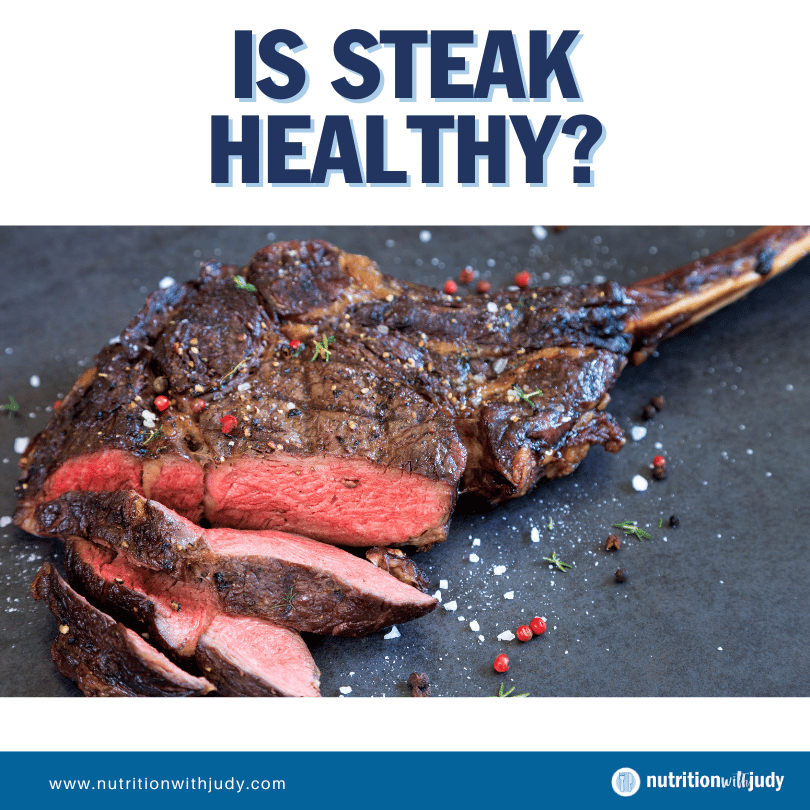

Is Steak Healthy?


Steak is a cornerstone of the carnivore diet, attracting individuals from varied backgrounds seeking a return to optimal health. For years, red meat has been unfairly vilified and overshadowed by misconceptions and outdated dietary advice. Yet, the carnivore diet emerges as a beacon of nutritional truth, challenging long-held beliefs and offering a path to healing and wellness.
With many mistruths and misconceptions about nutrition and diet, some may find themselves asking, “Is steak healthy?” This diet, rich in nutrient-dense foods such as steak, may seem indulgent but actually nourishes the body in the most effective way possible. By embracing the carnivore diet, we confront the baseless demonization of red meat while revealing a powerful tool for achieving unparalleled health benefits.
Join us in exploring why steak is not just healthy but essential for a thriving life.
What Is the Carnivore Diet?
The carnivore diet, tailored for various health objectives, encompasses multiple adaptations to cater to unique dietary needs.
- Beef-Only Approach: Ideal for those addressing autoimmune or chronic conditions, focusing exclusively on beef for its simplicity in elimination diets, though diversity in meats is advised for long-term nutritional balance.
- Lion Diet: Targets individuals needing strict elimination protocols, relying solely on ruminant meats, salt, and water, perfect for gut and autoimmune healing, with a phased approach to reintroducing other meats.
- Nose-to-Tail Method: Encourages whole-animal consumption, including organ meats, to achieve a broad nutrient spectrum, cautioning against potential vitamin imbalances for those with specific health conditions.
- Meat-Only Carnivore Diet: Embraces all muscle meats while excluding organ meats, dairy, and eggs, serving as a base elimination diet for those well-tolerated to muscle meats.
- Zero-Carb Carnivore Diet: Prioritizes meats, dairy, and eggs with minimal to no carbs, suitable for those without autoimmune or severe chronic issues and who can digest dairy/eggs.
- Carnivore Keto Diet: Blends ketogenic principles with carnivore guidelines, introducing low-toxicity plant foods for those with good metabolic health and resolved chronic conditions.
- Carnivore-Ish Keto Adaptation: Allows for greater flexibility by incorporating more ketogenic elements alongside a predominant meat intake, aimed at metabolically healthy individuals without food addictions.
- Animal-Based Diet: Broadens the carnivore spectrum to include fruits, honey, and raw dairy, clinically observed to usually benefit only those with high metabolic flexibility and athletes. We don’t recommend this variation for a variety of risk factors.
What Are the Benefits of the Carnivore Diet?
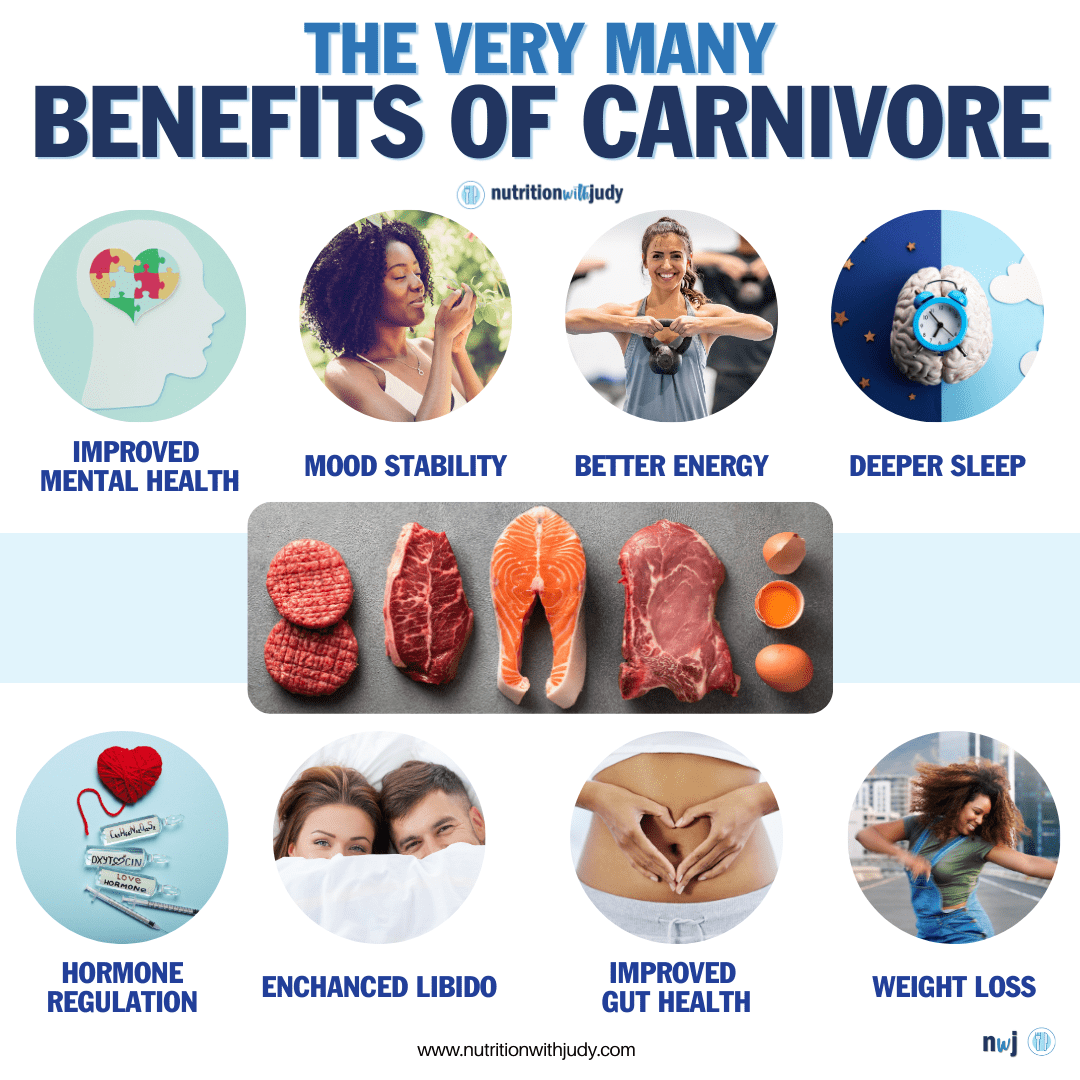

The carnivore diet, centered on animal-based foods, offers a range of benefits that cater to those seeking health optimization, simplicity in dietary habits, and a solution to various health issues. Here’s a summary of its advantages:
- Nutrient Density: Animal products are rich in essential nutrients that are bioavailable, meaning the body can absorb and utilize them more efficiently than plant-based nutrients. This includes high-quality protein, essential fatty acids, vitamins such as B12, D, A, and minerals such as iron, zinc, and selenium.
- Simplicity and Convenience: The diet simplifies eating by focusing on meat, eliminating the need to track macros or count calories meticulously. This simplicity can lead to a more sustainable and less stressful approach to eating.
- Digestive Health: By eliminating fiber-rich plant foods, many individuals report improvements in digestive issues such as bloating, gas, and irritable bowel syndrome (IBS). The diet’s emphasis on meat can lead to a reduction in gut inflammation for some people.


- Weight Management: The high satiety level of meat can help regulate appetite and reduce overeating, leading to weight loss or maintenance without the need to restrict calories consciously.
- Mental Clarity: Some adherents report enhanced mental clarity and focus, possibly due to stable blood sugar levels from consuming low-carb, high-protein, and fat meals.
- Improved Energy Levels: The diet can lead to more stable energy levels throughout the day, without the highs and lows associated with carbohydrate-rich diets.


- Autoimmune and Inflammatory Conditions: Our clinical practice along with anecdotal evidence supports that the carnivore diet may help in managing autoimmune diseases and reducing inflammation by eliminating potential dietary triggers found in plant foods.
- Blood Sugar Control: By excluding carbohydrates, the carnivore diet can significantly improve blood sugar levels and insulin sensitivity, making it an attractive option for those with diabetes or metabolic syndrome.
- Skin Health: Many individuals experience improvements in skin conditions, such as acne and eczema, likely due to the elimination of inflammatory food triggers and the diet’s high content of nutrients important for skin health.
- Joint Health: Reports of reduced joint pain and improved mobility are common, possibly due to the anti-inflammatory effects of consuming a diet low in plant antinutrients and high in omega-3 fatty acids.
- Heart Health: Despite concerns over saturated fat, many people on the carnivore diet report improved markers of heart health, such as improved blood pressure and decreased triglycerides.
- Enhanced Athletic Performance: The diet supports muscle maintenance and growth due to its high protein content, potentially improving strength and endurance.
- Mental Health Benefits: With mood-enhancing nutrients and studies to back the power of meat for mental health, the carnivore diet is ideal for supporting mental health conditions such as depression and anxiety.
- Tailored to Individual Needs: The carnivore diet offers various adaptations, allowing individuals to customize their approach based on health goals, existing conditions, and dietary preferences.
The carnivore diet presents a radical health evolution, allowing individuals to reclaim their wellness and lead a life nearly symptom-free. With its focus on high-quality animal foods, the diet provides a nutrient-rich, straightforward way to potentially improve health, enhance physical and mental performance, and simplify dietary choices.
What Are the Nutritional Benefits of Steak?
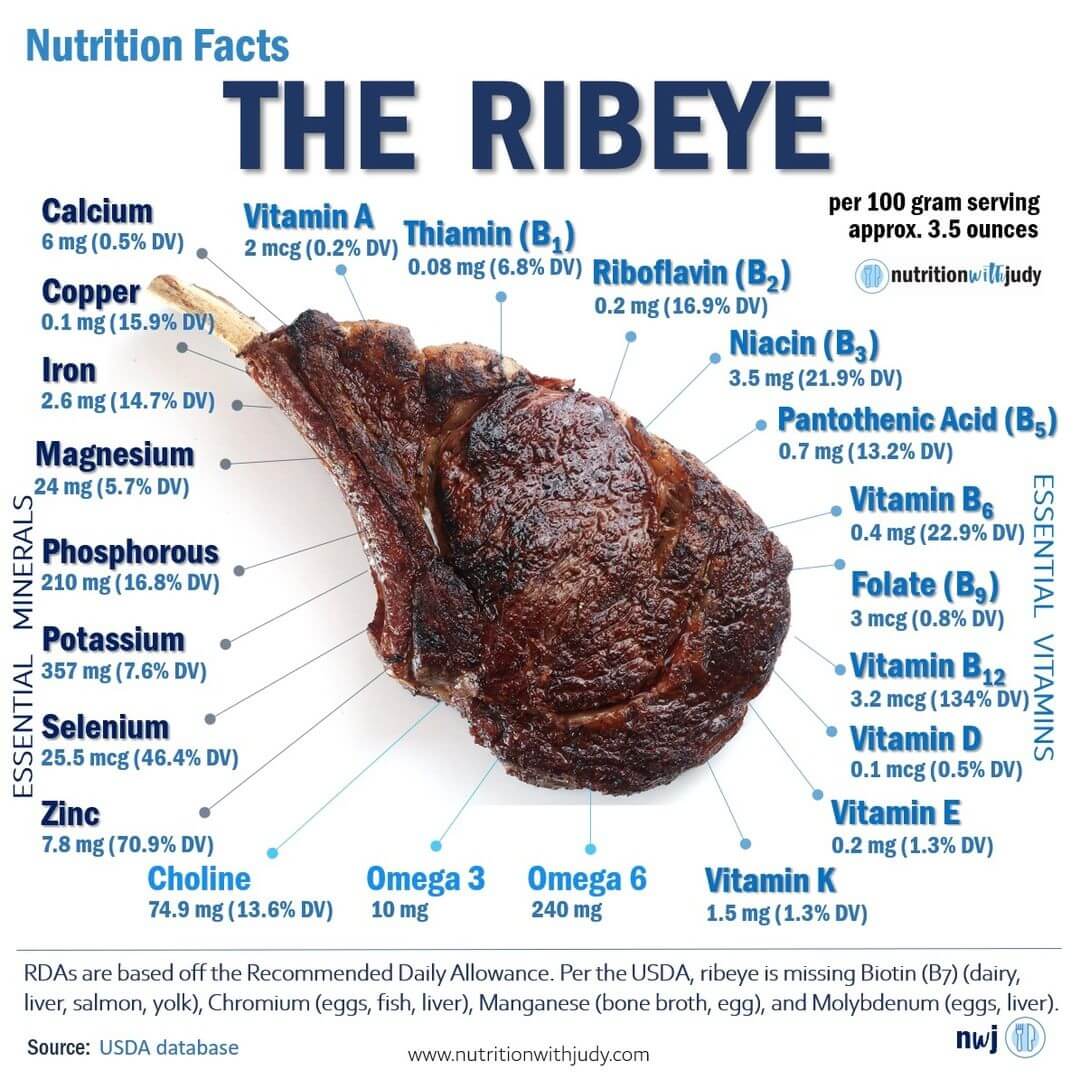

Steak, a celebrated component of the carnivore diet, is a superfood that’s packed with an array of nutrients essential for optimal health. Here’s a summary of some of its nutrients and corresponding health benefits:
- Protein: Steak is a rich source of high-quality protein, crucial for muscle repair, growth, and overall bodily functions. Protein also aids in weight management by promoting satiety.
- Iron: The heme iron found in steak is easily absorbed by the body, essential for forming hemoglobin, which transports oxygen in the blood, reducing the risk of anemia.
- Vitamins B12 and B6: Vitamin B12 supports nerve function and the production of DNA and red blood cells, while B6 is vital for brain health and energy metabolism.
- Zinc: Important for immune function, wound healing, and DNA synthesis.
- Selenium: Plays a key role in thyroid hormone metabolism and antioxidant defense systems, protecting the body from damage caused by free radicals.
- Omega-3 Fatty Acids: Though less than in fish, the omega-3s in grass-fed steak can contribute to heart health and reduce inflammation.
- Creatine: Supports muscle function and performance, particularly beneficial for athletes and those engaged in regular physical activity.
- Carnosine: Acts as an antioxidant, protecting against various diseases and aging by reducing inflammation and combating oxidative stress.
The direct health benefits of consuming steak include improved muscle mass, better brain function, enhanced immune response, and reduced risk of anemia. The nutrient density of steak makes it an excellent food choice for those looking to support their overall health while enjoying a rich and satisfying meal.
Why Else Is Steak Healthy?


Steak is a healthy option not only for its nutrient density but also because it sidesteps issues common to plant-based foods. Plant foods can contain anti-nutrients such as lectins and phytates, which may interfere with the absorption of minerals and cause digestive issues. Additionally, concerns around glyphosate exposure—a common herbicide linked to health risks—are avoided with steak, particularly if sourced from grass-fed, organically-raised cattle.
Mold contamination, a risk in stored grains and legumes, is not a concern with properly handled and stored meats. Furthermore, the debate around genetically modified organisms (GMOs) in the plant food supply does not apply to steak, offering a simpler, more natural dietary choice. By choosing steak, individuals can enjoy a rich source of essential nutrients without the added worries of anti-nutrients, chemical exposure, mold contamination, or GMOs, making it a compelling, simplified option for those seeking a healthful diet.
Should I Include Steak In My Carnivore Diet?
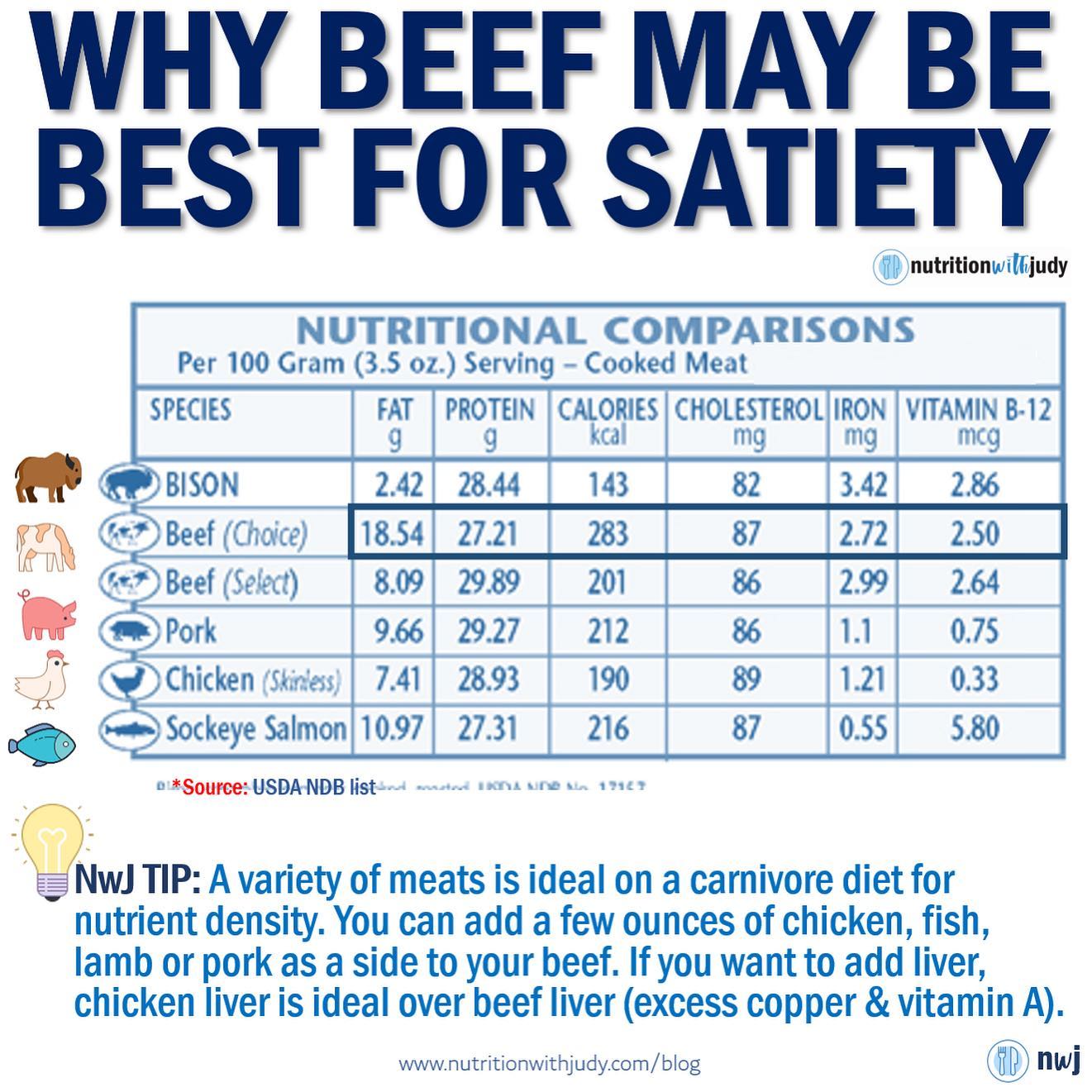

Steak offers unmatched satiety, superior nutrient density, and a rich flavor profile, making it a sought-after choice. Its high content of essential nutrients such as complete proteins, B vitamins, and minerals supports muscle maintenance, energy levels, and overall health.
Steak’s ability to satisfy hunger with fewer calories helps in managing weight effectively. The joy and satisfaction derived from its consumption enhance dietary adherence, ensuring that individuals can sustain this lifestyle long-term, reaping both the physical and psychological benefits.
Grain-Fed vs. Grass-Finished Steak
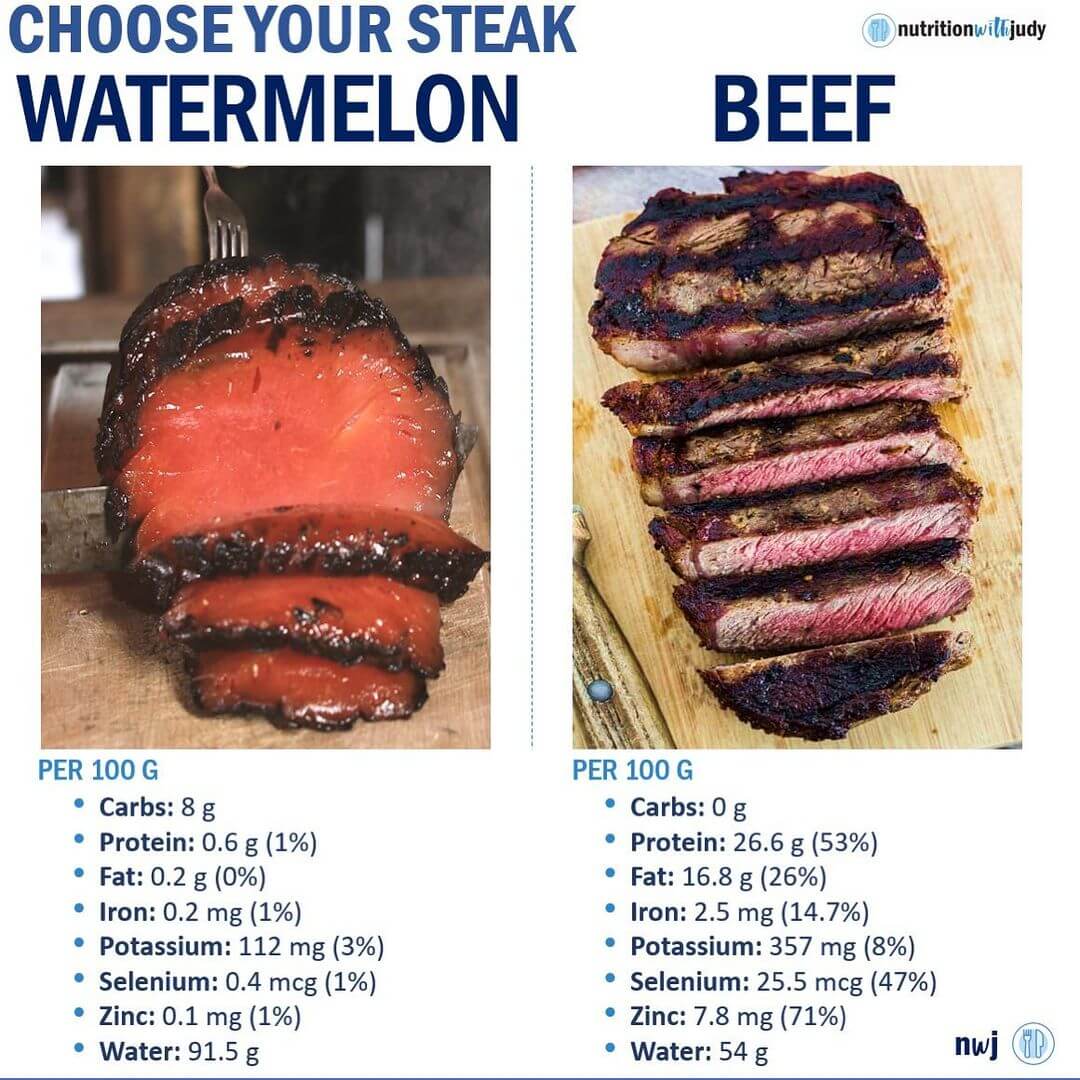

Grain-fed and grass-fed steak differ significantly in terms of diet, environmental impact, nutritional profile, and often taste. Grain-fed cattle are raised on a diet that includes grains, leading to a fattier steak with a milder flavor. Grass-fed cattle, on the other hand, graze on grass throughout their lives, resulting in leaner steaks, with a more distinct taste and higher levels of omega-3 fatty acids and antioxidants.
While many thrive on grain-fed steak, individuals with autoimmunity and severe gut issues may only tolerate grass-fed steak, especially during the healing phase. Grass-fed steak can be a crucial part of a dietary strategy aimed at optimizing health and mitigating specific health concerns. We always advocate eating the meat you like and can afford. For those with deeper health issues, you may have to opt for higher-quality steaks only while you heal.
Closing Thoughts On Steak and the Carnivore Diet
The carnivore diet, centered on animal-based foods such as steak, offers numerous health benefits, including high-quality protein and essential nutrients such as iron, B vitamins, and omega-3 fatty acids. It simplifies dietary choices while providing significant health improvements, particularly in digestive health and weight management.
After taking a closer look at the health properties of steak, we’re circling back to our initial question: “is steak healthy?” The answer is yes. Steak is a nutritional powerhouse and should be included in every diet.
The choice between grain-fed and grass-fed steak depends on individual health needs, with grass-fed options offering higher levels of omega-3s and antioxidants, beneficial for those with specific health concerns. This diet’s approach promotes simplicity, nutrient density, and satisfaction, making it appealing for optimizing health.
Work With Our Trusted Carnivore Diet Functional Nutritional Therapy Practitioners
The Nutrition with Judy practice is honored to be a trusted carnivore diet practitioner support serving clients from around the globe. We’re passionate about helping our clients achieve root-cause healing in order to lead the best quality of life possible that’s nearly symptom-free. Our team is dedicated to educating our community about the incredible benefits of the carnivore diet. We welcome you to explore our free resources and are always available to support you through personalized protocols. Our Symptom Burden Assessment (SBA) is the perfect starting point for discovering your root cause and is required to work with our team— you can learn more in-depth about this powerful tool here.
Start your root-cause healing journey today and contact us any time with any questions or concerns.
DISCLAIMER: This content is for educational purposes only. While we are board-certified in holistic nutrition and are nutritional therapy practitioners, we are not providing medical advice. Whenever you start a new diet or protocol, always consult with your trusted practitioner first.





